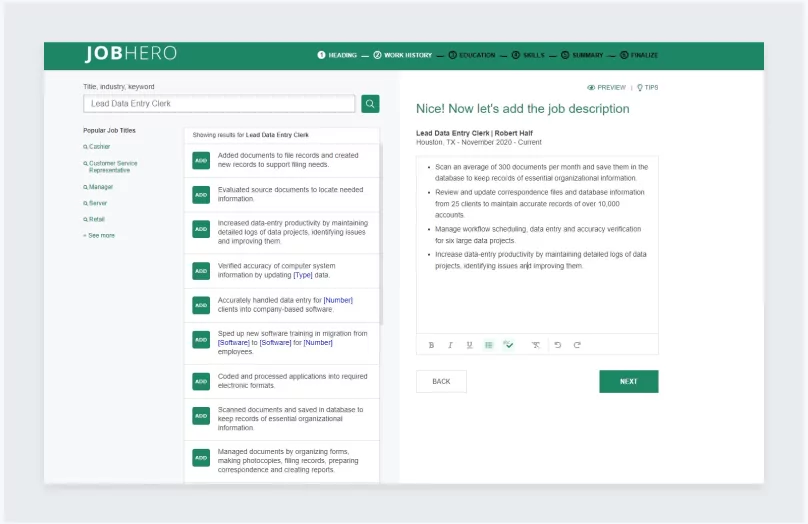Do you have a passion for teaching and a desire to work in the corporate world? If so, then a career as a corporate trainer may be the career for you. This article will explore how to become a corporate trainer, its educational requirements and salary expectations. We also feature resume resources including our professional Resume Builder. Our certified resume writers have created a library of resume samples to show you exactly what a strong resume looks like. Use them as-is or customize them to your needs.
If you are having writers block, our resume examples can help. Choose from hundreds of job titles to find the right example for your needs.
Impress your future boss! According to a 2020 survey, most hiring managers read cover letters for candidates they’re considering interviewing before making their final decision. Make a cover letter that seals the deal with our professionally designed cover letter templates.

Create your professional resume in just minutes.
- Choose from 20+ recommended templates
- Add pre-written experiences, skills and summary
- Download and send
What Does a Corporate Trainer Do?
A corporate trainer is essentially a teacher who works in a corporate setting. They spend their days training employees on new skills, strategies and systems relevant to their industry. A corporate trainer can find work in virtually any industry, but their typical work environment is in an office setting.
Being a corporate trainer requires a love for helping people, as most of their job revolves around teaching.
Some common daily tasks for a corporate trainer include:
Public speaking tasks, such as teaching company strategies to small or large groups.
Observational tasks, such as monitoring the engagement levels of session participants.
Collaborative tasks, like strategizing with project stakeholders to decide on training content and strategy.
Identifying company training needs.
Scheduling training sessions according to educational needs.
Overseeing seminars, workshops and personalized training sessions.
Planning and implementing an effective training curriculum.
Managing training budgets.
Training new hires.
How to Become a Corporate Trainer
The Bureau of Labor Statistics shows a projected 8% job growth through 2031. While the annual wage for training and development specialists is $61,570. Here are the steps to becoming a corporate trainer.
Earn a bachelor’s degree:
To become a corporate trainer, most employers require a bachelor's degree in business, communications or education. Many corporate trainers choose a specialty. The most in-demand subject areas are human resources, business management, organizational administration, educational psychology and information technology (IT). As you complete your studies, you will become a subject-matter expert in labor laws, training and development, performance evaluations, organizational behavior, job analysis and workplace diversity.
Licensing and certification:
Certification is not required to find employment as a corporate trainer, but it does make your candidacy more attractive in today’s job market. Professional institutes such as the Association for Talent Development (ATD) and the International Society for Performance Improvement (ISPI) offer certification programs for corporate trainers. Here are five corporate trainer certifications you can consider:
- ATD’s Certified Professional in Talent Development (previously called Certified Professional in Learning and Performance)
- HRCI’s Professional in Human Resources (PHR)
- HRCI’s Senior Professional in Human Resources (SPHR)
- SHRM Certified Professional (SHRM-CP)
- SHRM Senior Certified Professional (SHRM-SCP)
Professional organizations to jumpstart your career:
Organizations can greatly benefit your career as a corporate trainer. For instance, the Association for Talent Development offers educational opportunities including professional certificate programs and online courses. You can join a local chapter or attend various conferences and events throughout the year locally, nationally and internationally.
Other popular organizations are the National Speakers Association and Toastmasters International with over 16,000 clubs worldwide and more than 300,000 memberships. Their focus is to improve your public speaking skills.
Create a job-winning resume:
Having a professional resume and cover letter is critically important because it is a direct reflection of how you want to present yourself. Impress hiring managers with an industry-specific resume that targets the employer's needs. Check out our resume samples to gain insight into how other professionals create a stellar resume.
Enrich your job application by matching it to a cover letter. By doing so you are boosting your chances of getting noticed. Check out how to use our cover letter samples to market your corporate trainer skills and experience.
Corporate Trainer Skills
Being a successful corporate trainer requires heightened interpersonal skills to create fast connections with trainees. It also demands a high energy level and comfort speaking in front of a group.
Corporate trainers who can successfully break the ice and get their trainees to engage with the materials are the ones who rise to the top of the industry.
Corporate trainer hard skills:
Corporate trainer soft skills:
Insights from a Corporate Trainer
We had a chat with a Corporate Trainer to give you a clearer picture of this career path. We chatted with Todd Averett, President of Leading People Partners, which is a firm that specializes in providing training, coaching and consulting in the areas of leadership, change, strategy and talent. Before starting Leading People Partners, Todd was the Director of Training and Development for Payless ShoeSource. Here’s what he had to say.
What is the common career path for a Corporate Trainer?
I’ve seen three paths. One is to receive a degree in instruction or curriculum design and take a corporate training role right out of college. The second has been a technical or operations person who has provided technical or operational training to groups within their organization, find that they like it, and then transition full time into corporate training. The third path I’ve seen has been an HR or Organization Development person transition into a training role, utilizing their education and background.
What should someone consider before becoming a Corporate Trainer?
I would recommend that people really understand two things.
1) What is the organization’s culture and strategy around training? Is it funded and supported continuously? Is it viewed as critical to enabling business objectives? Are people provided time for development and training? These questions will make a huge difference in the impact of the training and the job satisfaction of the corporate trainers.
2) Do those interested in training care more about the people that they are training, and the business objectives, than themselves being in front of others? The best trainers listen extremely well, modify content and approaches to meet the needs of the business and the participants, and know when a training solution is best or when another kind of solution might work better.
What type of person excels in this job?
Someone who really understands the business—key metrics, sales and cost drivers, and so on—and also really understands how adults learn. The best trainers I know not only “know their stuff” but also have an authentic, genuine style where they put the learner in the center, not themselves.
What are some of the most important skills for a Corporate Trainer to have?
It is a given that a corporate trainer needs instructional design and presentation skills. More important in my opinion is someone who can really do needs analysis, which is really digging into requests for training to find out if the solution is really training or something else. Also, deeply understanding the business and how to improve personal and business performance ensures that corporate trainers stay relevant and influential.
What do you find to be the most rewarding aspect of being a Corporate Trainer?
The opportunity to make a real difference, both at the individual level and ideally at the company level. It is terrific and rewarding to see people change and become more effective, and even more so to see entire departments and organizations to evolve and grow.
How Much Does a Corporate Trainer get Paid?
The national median salary for a Corporate Trainer is $58,200. Those at the top 10 percent of the spectrum earn above $99,700, while those at the bottom 10 percent of the spectrum earn less than $32,200.
Top 10 States for Corporate Trainer Salary
The following states have the highest median salaries for Corporate Trainers.
Corporate Trainer Resources
Check out this list of resources if you want to explore the world of a Corporate Trainer further.
Around the Web
AllenComm
AllenComm is a global training-consulting firm with over 35 years of experience. Their blog is updated weekly with articles that are perfect for aspiring Corporate Trainers.
LearningRebels.com
Learning Rebels is written by a Corporate Trainer by the name of Shannon Tipton. Shannon shares stories of her experience as a Corporate Trainer that are excellent reads for those looking to break into the industry.
Ziglar.com
Zig Ziglar is the grandfather of the self-help niche. He is internationally renowned for his sales training systems, and his blog is regularly updated for those who want to learn how to motivate and develop others.
Professional Groups
The Association for Training Development
This organization facilitates the CPLP certification exam. Their website contains practice exams, a list of conference dates and links to several publications relevant to Corporate Trainers.
National Staff Development and Training Association
NSDTA was founded in 1983, which makes it one of the oldest professional organizations or Corporate Trainers. Their website has information on membership, as well as links to a bunch of helpful resources.
Books
The Big Book of Humorous Training Games
Written by Doni Tamblyn and Sharyn Weiss, this book contains hundreds of fun games designed to break the ice among trainees while simultaneously hammering home important concepts.
ASTD Handbook: The Definitive Reference for Training and Development
Written by Elaine Biech, this book is sponsored by the Association for Training Development. This is a great resource for any Corporate Trainer to have on his or her bookshelf.
Telling Ain’t Training: Updated, Expanded, Enhanced
Written by Harold D. Stolovitch and Erica J. Keeps, this book dives into the principles of adult learning and provides dozens of strategies for reaching adult learners.




